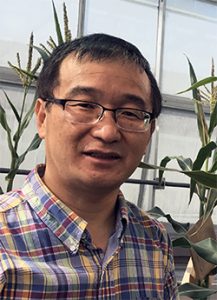Plant Stress

Dec. 11, 2020
So-Yon Park
Host-Parasitic plant interaction is a fascinating model to study Plant-Plant interaction. Park is interested in how mobile RNAs and proteins are exchanged, transferred, and functional in other organisms through the host-parasite interaction. Cuscuta (stem parasitic plant) and Phelipanche (root parasitic plant) growing on Arabidopsis, tomato, and soybean are major parasites used in Park lab. We are also interested in how small RNAs are transported and suppress target genes under drought stress in soybeans. Educational Background B.S., Dankook University, South KoreaPh.D., Seoul National University, South Korea…

Dec. 2, 2020
Jacob Washburn
Educational background Ph.D., Biological Sciences, University of Missouri M.S., Plant Breeding, Texas A&M University B.S., Biology, Brigham Young University…

Sep. 7, 2019
Scott C. Peck
Educational background Ph.D., Michigan State University Courses taught Biochemistry 2480: Introduction to Macromolecular Structure and Function Biochemistry 8200: Principles and Research Practices in Biochemistry…

Sep. 2, 2019
Abraham J. Koo
JA SIGNALING IN WOUND RESPONSE AND INSECT RESISTANCEOur research involves the study of small signaling molecules that cells use to detect extracellular stimuli and to coordinate intra- and intercellular responses. To compensate for their lack of mobility, plants rely heavily on chemical cues to interact with their surroundings. This is one reason why plants are rich sources of pharmaceuticals and provide attractive models for studying chemically mediated cell signaling. We employ highly sensitive mass spectrometry-based methodologies to capture and monitor plants’ chemical signals. The combined approach of mass spectrometry and genomics in the model plant Arabidopsis thaliana has allowed us…

Sep. 9, 2018
Mariola Usovsky
Mariola is a passionate molecular soybean breeder and scientist with over 10 years of public soybean breeding experience. She is highly involved in the soybean breeding pipeline and release of many soybean cultivars. Her expertise includes introgression of traits that involve high oleic and low linolenic genes for improving soybean fatty acid composition, protein genes for increasing seed protein content, soybean cyst nematode resistance genes, and genes with tolerance to Liberty® and Enlist® herbicides. She works towards optimizing plant breeding schemes to help reduce costs and time. Moreover, Mariola develops strategic directions, goals, and plans for molecular research, and provides…

Aug. 22, 2018
Melvin Oliver
The approach that I have developed is a combination of functional and comparative phylogenomics, a merging of genomics and phylogenetics, underpinned by a sound understanding of the morphology, phenology, physiology and molecular biology of the plants I have chosen to focus on. Using two phylogenetic approaches, ancestor-descendant comparisons and sister-group contrasts, my specific goals relate to identifying and understand the function of those genes and processes that are truly adaptive with regards to dehydration tolerance in plants. My work has focused on three primary models each uniquely positioned to experimentally address the adaptive aspects of dehydration tolerance. We utilize the…

Aug. 21, 2018
Bing Yang
Bing’s group has used rice as a workhorse to develop genome editing technologies and demonstrate their promising potential as biotech tools for basic and applied research in rice and other crop plants. With the increasingly available sequences of many plant genomes, technologies for genome editing have become the most promising and popular tools for scientists to understand such complex genomes and precisely and quickly manipulate them for good. Genome editing technologies allow precise, targeted genomic changes. TALENs and CRISPR/Cas represent the state-of-the-art genome editing technologies and hold immense promise for defining the genetic and molecular basis for valuable traits, as…

Jan. 10, 2018
Xi Xiong
Educational background Ph.D., Crop Science with an emphasis in Horticulture, Oklahoma State University…

Jan. 10, 2018
Michele Warmund
Educational background Ph.D., Agronomy/Weed Science, University of Missouri M.S., Horticulture, Kansas State University B.S., Horticulture, Kansas State Universtiy…

Jan. 10, 2018
Gary Stacey
Gary Stacey is Curators’ Distinguished Professor and Professor of Plant Science and Technology at the University of Missouri-Columbia. His research focuses generally on molecular aspects of plant-microbe interactions, including studies of the beneficial legume-rhizobium symbiosis and plant-fungal pathogen interactions. He has also been instrumental in the development of genomic resources for the study of soybean. He has mentored 51 postdoctoral fellows and 36 Ph.D. and 8 M.S. graduate students. Past postdocs have gone on to start independent careers in academia (e.g., Michigan State Univ., Washington State Univ.), industry, as well as winning the 2005 USA National Medal of Technology, which…
- « Previous
- 1
- 2
- 3
- Next »